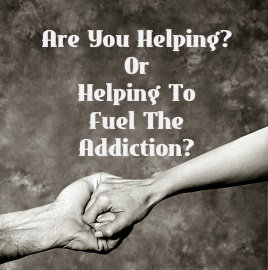Substance Abuse Enabling
The term “enabler” is often used in the context of a relationship between a loved one and someone struggling with substance abuse. Whether the addiction stems from drugs or alcohol, the enabler often suffers from the effects of the person with addiction’s behaviors. In this article, we will discuss the ins and outs of enabling while offering insight and tips to help ensure a healthy and happy resolution for all involved.
Consequences Of Addiction
An enabler removes the natural consequences of addiction from the person with addiction by way of financial and emotional means. Many professionals warn against enabling due to the effect these consequences have on an individual’s incentive to seek help. Simply put, if someone with a substance abuse disorder is never allowed to “hit rock bottom,” there is little reason for them to alter their behavior.
Health Consequences Of Addiction
Enabling poses mental health consequences to both the enabler and the addicted individual alike. The behavior typically begins with good intentions, such as a desire to help. Over time, however, enablers – often codependents – act out of desperation. Resentment builds as the family dynamic becomes skewed. In later stages, an enabler will find themselves overcompensating for the individual’s actions while the individual escalates their self-destructive pursuits.
Legal & Financial Consequences Of Substance Abuse
As enabling behaviors continue, both parties raise the risk of legal and financial consequences. Enablers often support addicted loved ones through financial means, placing strain on household expenses and family relationships. Other examples of enabling include lying to the individual’s employer to cover up absenteeism, screening phone calls, making excuses on the addicted loved one’s behalf, fulfilling their commitments to others, and bailing them out of legal trouble.
The Difference Between Helping And Enabling
There are countless viewpoints when it comes to the difference between helping and enabling, and there is, sometimes, a fine line between the two. However, a good guideline is this:
- Help is doing something for someone that they can’t do themselves.
- Enabling is doing something that someone can and should be doing themselves.
Frequently, help that is provided to someone struggling with addiction simply makes it easier for them to get worse. When this happens, those who are providing the help become contributors to the problem, and in turn, are also affected by the disease.
This pattern can continue for long periods of time until the individual is forced to face the consequences of their actions. When this happens, reality often begins to set in, and positive change is more likely.
For the loved ones of those struggling with substance abuse, it’s essential to identify enabling behavior and stop it before it begins. Offers to give money, obtain legal assistance, or make calls to landlords or employers may seem helpful in the short term. However, these efforts can have a long-term negative effect. These are ways to buffer the individual from the consequences of addiction.
Often, one of the best ways to support an addicted loved one without enabling them is to step back and allow the individual to experience the consequences of their actions. Joining support groups such as Al-Anon can also be beneficial for loved ones and friends of addicted individuals. These groups discuss issues related to addiction and shared strategies for stopping enabling behaviors.
Rather than covering up or attempting to fix an addicted loved one’s problems, the best help that can be provided is to recommend professional help. An intervention is a great way to accomplish this, and it can lead to that first step towards getting an addicted loved one effective help and treatment.

